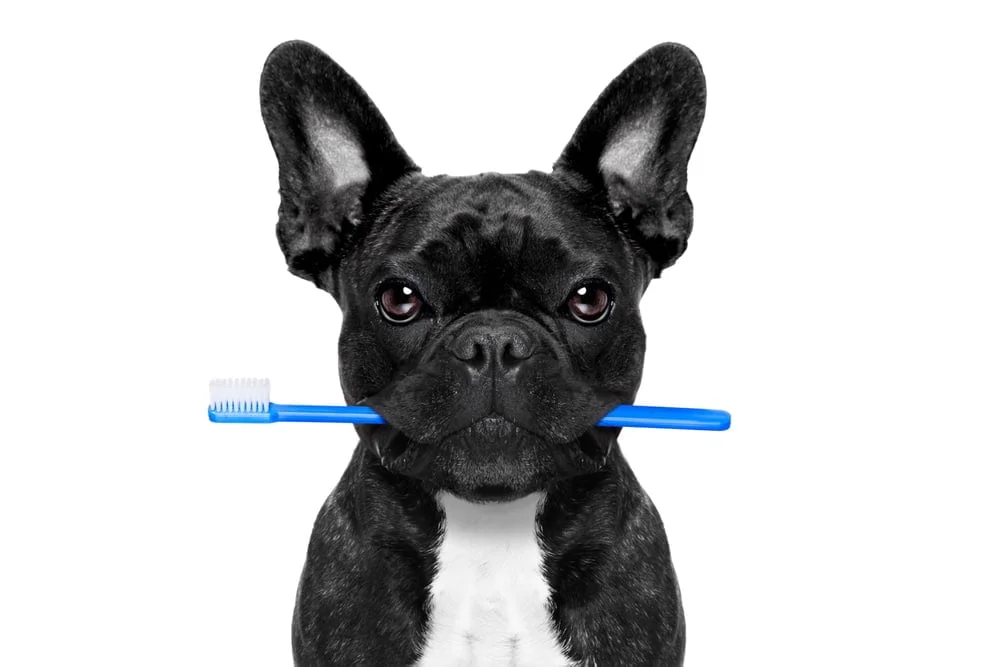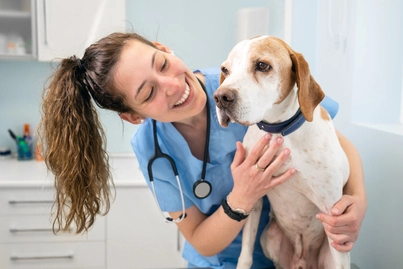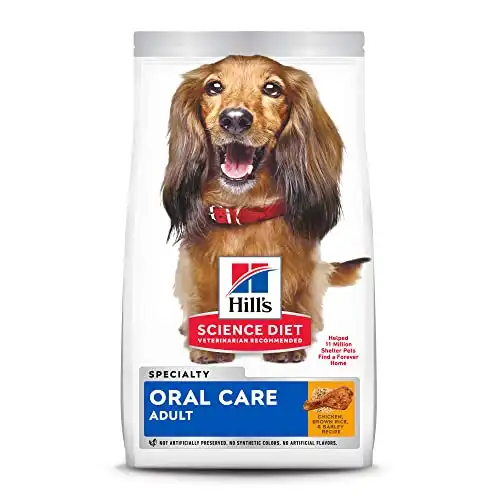French Bulldogs are known for their smushed, adorable face. Along with their small face comes a small mouth.
There are a lot to know when it comes to French Bulldog teeth, including the stages of teething, potential oral issues, caring for teeth, and fun facts.
Stages of French Bulldog Teething
Just like babies, French Bulldog puppies experience teething. When becoming a new puppy parent, it’s good to know what to expect during the teething process. Here are the teething stages of a Frenchie puppy.
Two to three weeks old: baby teeth start coming in
Since the breeder is the one who is with a pup this young because it’s still with its mother, you won’t be around for this part of the teething phase (unless, of course, you are the breeder).
There are 28 baby teeth in total (front teeth or incisors, canine teeth, and pre-molars).
Twelve weeks and older: teething begins, and adult teeth start growing
Fairly early on, French Bulldogs’ adult teeth start growing in and push out baby teeth. This is when you may start finding teeth and blood spots, a very normal part of teething.
Eventually, the 28 baby teeth will be replaced by 42 adult teeth.
Six to seven months old: teething will stop
Puppies teethe longer than some may realize. Their baby teeth grow in much quicker than their adult teeth. Their molars take especially long to grow in fully.
By around eight months old (sometimes sooner), French Bulldog teeth are all grown in, and your pup should have 42 healthy, strong teeth.
Signs Your French Bulldog Puppy is Teething
- Excessive chewing and drooling: As we know, puppies are known to chew. This is because chewing helps relieve gum and teeth pain experienced during teething. You will also probably notice drool.
- Small, loose milk teeth: Small baby teeth start to fall out as adult teeth grow in. You’ll likely find these around your home. Frenchies love tasty treats from the tooth fairy!
- Flopped ears: Many Frenchie owners worry when their puppy French Bulldog’s ears don’t stand tall but don’t worry because this is normal. When a teething pooch bites down, pulsating movements occur and can strain their ear muscles which may result in their ears losing shape and drooping down. Additionally, calcium that their ears need in order to take their wanted shape is going to new teeth growing in instead. Their ears should become bat-like in no time when they are finished teething.
- Blood spots: When a puppy’s teeth are falling out, their gums will probably start to bleed so, like when a human’s tooth falls out. This is to be expected and isn’t anything to worry about.
- Red, swollen gums: As new teeth are trying to make their way through the gums, your French Bulldog’s gums will likely appear red and inflamed.
Ways to Help Your Teething Puppy
It can be understandably frustrating when your new French Bulldog is teething and chewing everything in sight to relieve their discomfort.
But, think of it this way: your new, cute pooch is probably in some pain, and their teething phase, thankfully won’t last. In the meantime, there are some things you can do to help the chewing and pain that teething brings.
- Give your pup something to chew on. Teething chew toys for your new puppy can save your furniture and shoes.
- Puppy-proof your home. Put away things your baby Frenchie may chew on and close doors to rooms you don’t want it going into.
- Give frozen snacks like ice and bananas to relieve its discomfort and give it something to do.
- Exercise your pup. Walks with your Frenchie is another topic to read about, but short walks and playtime to get your dog’s energy out can prevent them from excessive chewing.
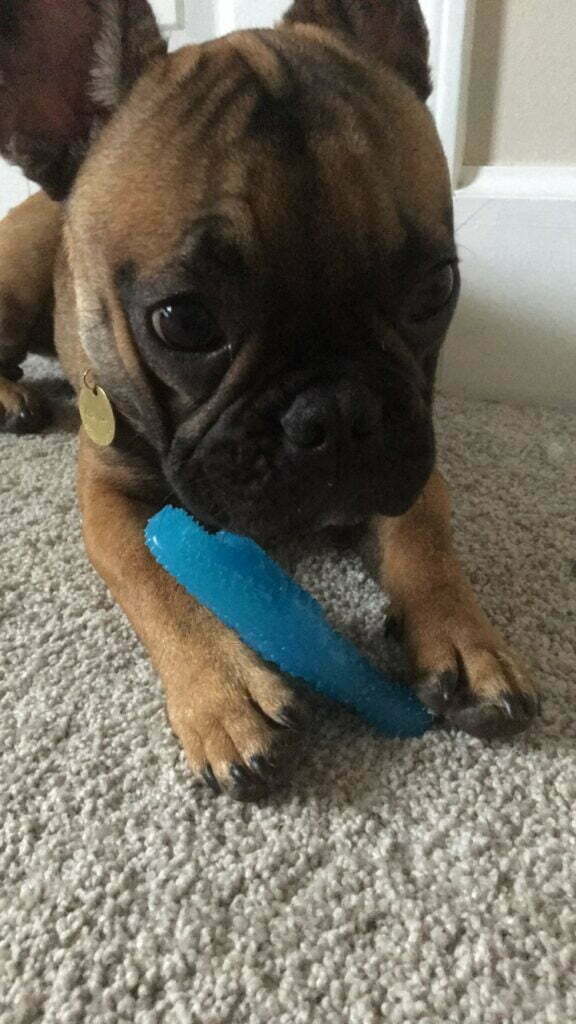
Possible French Bulldog Teeth Issues
Because French Bulldogs are a Brachycephalic breed and have small faces in addition to an underbite, they are prone to dental issues. All adult dogs have forty-two teeth, and being that Frenchies teeth must all fit into a fairly small mouth, you must keep an extra eye out for your pup’s dental care.
Possible Dental Problems
- Plaque and tartar: A film that develops on the teeth is caused by food build-up and lack of cleaning. It’s composed of bacteria and smells foul, and if it’s been there for too long, it may turn a yellow or brown color. It can cause tooth decay and gum irritation.
- Periodontal disease/gingivitis: Eventually, plaque and tartar buildup can result in bacteria getting under the gum and beginning to eat away the tissue and bone that holds teeth in place. It starts as gingivitis and eventually turns into periodontal disease, and teeth will start falling out.
- Abscesses: Bacteria at the root of a tooth start to cause pus build-up and becomes an infection known as an abscess.
- Tooth fractures: Force to a dog’s teeth from being hit or chewing can cause a fractured tooth. Signs of a tooth fracture is excessive drooling, difficulty eating, teeth grinding, and pawing at the mouth.
How to Care for French Bulldog Teeth
Many French Bulldog teeth issues can be prevented by following these simple steps:
Regularly Brush Teeth
Brushing your Frenchie’s teeth is the most important step for good dental health. While teeth brushing isn’t the most fun activity, it’s not such a daunting task if it’s done regularly.
- SOOTHING AND EFFECTIVE: Keep your dog's teeth and gums...
- CLEANS AND FRESHENS: Our dog toothpaste gently cleans away...
- TRIPLE HEAD TOOTHBRUSH: Our dog toothbrush features a...
Turn it into a bonding time with your fur child and have treats ready. When it’s time for a teeth brushing session, sit your pup in your lap, let it lick a bit of the toothpaste off your finger, and start brushing once your dog seems comfortable.
*Special note: never use human toothpaste, as it has ingredients that shouldn’t be ingested by dogs.
Professional Teeth Cleaning
If a dog’s dental health becomes too bad, your vet may recommend a dental cleaning visit which consists of an exam, cleaning, and polishing. This usually isn’t necessary if your Frenchie’s oral care is kept up with.
Connect with a verified veterinarian in minutes. No waiting for appointments or office hours. No high fees. Your pet's health made convenient and worry-free.
Provide High-Quality Food
A French Bulldog’s diet is important for many reasons, including their dental health. Many believe that feeding your pooch dry dog food versus wet food is better for its teeth. This may or may not be true. However, feeding your dog fruits and vegetables for snacks can certainly be beneficial.
Avoid treats with fat, sugar, and grains, and opt for things like apples, pumpkins, and carrots. Dog food that contains omega-3s and no additives is good for dental health. If your pup is experiencing bad breath and plaque buildup, there are kibbles specially for oral care.
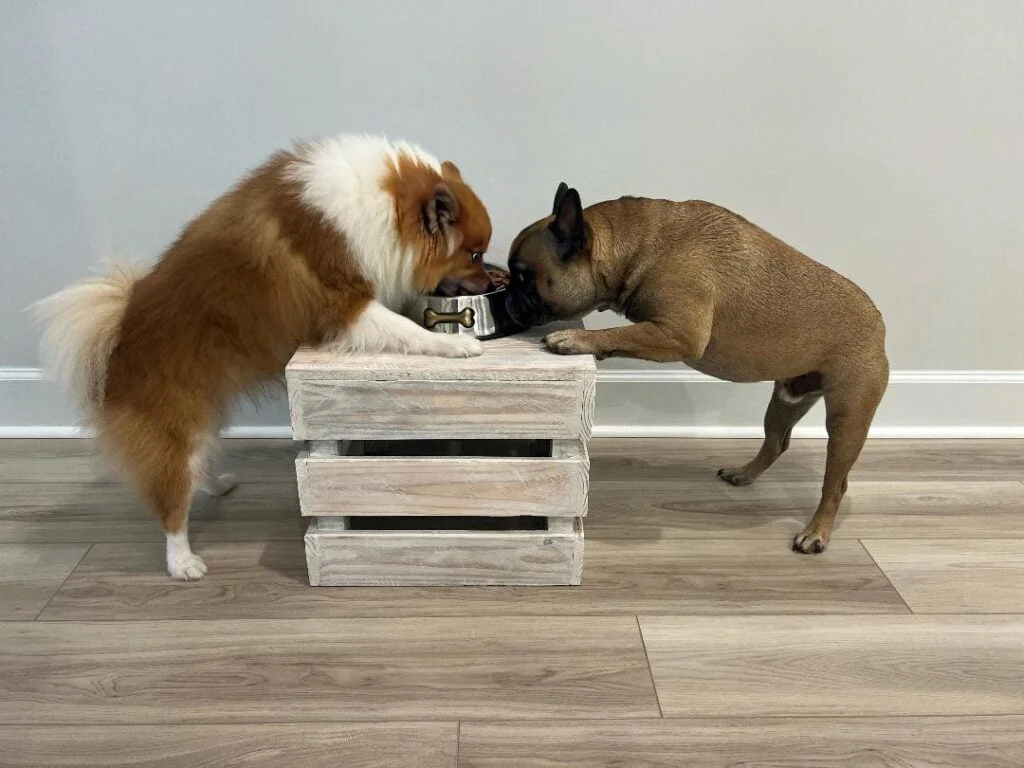
Chew Toys and Dental Treats
Textured chew toys and dental treats are specially made for dogs to gnaw on while plaque and tartar are rubbed away. Of course, less build-up on teeth also means fresher breath.
Regular Water
As your pup drinks water, they are preventing the yucky build-up on their teeth. Encourage your dog to drink lots of water by keeping their water bowl clean, providing fresh water often, and providing praise and cuddles when it drinks water.
Fun Facts About French Bulldog Teeth
French Bulldog owners may worry about their pooch’s teeth, given their small mouths and underbite. Carefully tending to your Frenchie’s teeth and realizing fun facts about their teeth can relieve this worry.
Different Kinds of Teeth Have Different Functions
Like people, French Bulldog teeth serve different purposes for cutting and tearing food. Their incisors, which are at the front of their mouth, are for grooming and scraping.
Their canine teeth, the long and pointy ones, are for biting down. Their canines are the ones that penetrate when they bite. Their premolars and molars are used for shearing and crushing and are used for heaving chewing.
‘Doggy Breath’ Actually Isn’t Normal
Many people think it’s okay for their dog’s breath to be smelly. However, if a Frenchie’s mouth is properly cared for, their breath should have a neutral smell free from foul odors.
Dogs Have More Teeth Than Humans
As mentioned, French Bulldog puppies have 28 teeth that eventually all fall out. As adults, dogs have 42 teeth. Adult humans, on the other hand, only have 32 teeth.
Their Bite Force is Stronger Than a Person’s
While it’s difficult to measure exactly, it’s thought that dogs have a stronger bite force than people do.
Dogs Rarely Get Cavities
Bacteria in a dog’s mouth versus a human’s mouth is different, and because of this, there’s a high chance your French Bulldog will never get a cavity. Human teeth typically have bacteria that come from sugars, but dogs don’t typically consume sugar. If a dog does get a cavity, it’s from eating sweet treats or table food.
Final Thoughts
Who knew there was so much to know about French Bulldog teeth?! But now that you know, you can understand the teething phase, be cautious of possible dental problems, and carefully care for your Frenchie’s mouth to keep its teeth healthy and shiny.
For more on the fabulous French Bulldog breed, check out this guide to choosing a French Bulldog rescue and tips and tricks to train your French Bulldog.
